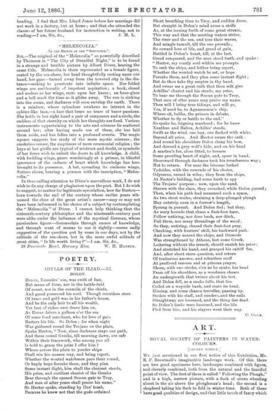"MELENCOLIA."
LTO THE EDITOR OF THE " SPECTATOR."1
SIR,—The original of the "Melencolia " so powerfully described by Thomson in "The City of Dreadful Night," is to be found in a strange and terrible picture by Albert Diirer, bearing the same title. Melencolia is there represented as a female figure, seated by the sea-shore, her head thoughtfully resting upon one hand, her gaze—turned away from the towered city in the dis- tance—seeking to penetrate into infinite space. Her folded wings are emblematic of impotent aspiration ; a book, closed and useless as her wings, rests upon her knees ; an hour-glass and a bell mark the time as it glides away. The sun is sinking into the ocean, and darkness will soon envelop the earth. There is a rainbow, whose splendour awakens no interest in the sphinx-like face,—a face that bears no trace of baser passions. She holds in her right hand a pair of compasses and a circle, the emblem of that eternity on which her thoughts are fixed. Various instruments appertaining to the arts and sciences lie scattered around her; after having made use of them, she has laid them aside, and has fallen into a profound reverie. The magic square suggests her study of the more mystic sciences ; the smokeless censer, the emptiness of mere ceremonial religion ; the keys at her girdle are typical of mistrust and, doubt, or symbolic of her fierce wish to unlock the doors to all knowledge. A child, with budding wings, gazes wonderingly at a primer, in blissful ignorance of the sadness of heart which knowledge has here brought to its possessor. A bat, spreading its ominous wings, flutters above, bearing a pennon with the inscription, " Alden- coils."
In thus calling attention to Diirer's marvellous work, I do not wish to fix any charge of plagiarism upon the poet. But I do wish to suggest, as matter for legitimate speculation, how far Burton— born towards the end of the century whose earlier years wit- nessed the close of the great artist's career—may or may not have been influenced in his choice of a subject by contemplating the " Melencolia " of Diirer. I cannot help thinking that the sixteenth-century philosopher and the nineteenth-century poet were alike under the influence of the mystical German, whose passionless figure—disconsolate through excess of knowledge, and through want of means to use it rightly—seems sadly suggestive of the question put by some in our days, not by the solitude of the sea-shore, but in the more awful solitude of great cities, "Is life worth living ?"—I am, Sir, &c., 28 Dumeombe Road, Honzsey Rise. W. H. HARPER.


































 Previous page
Previous page